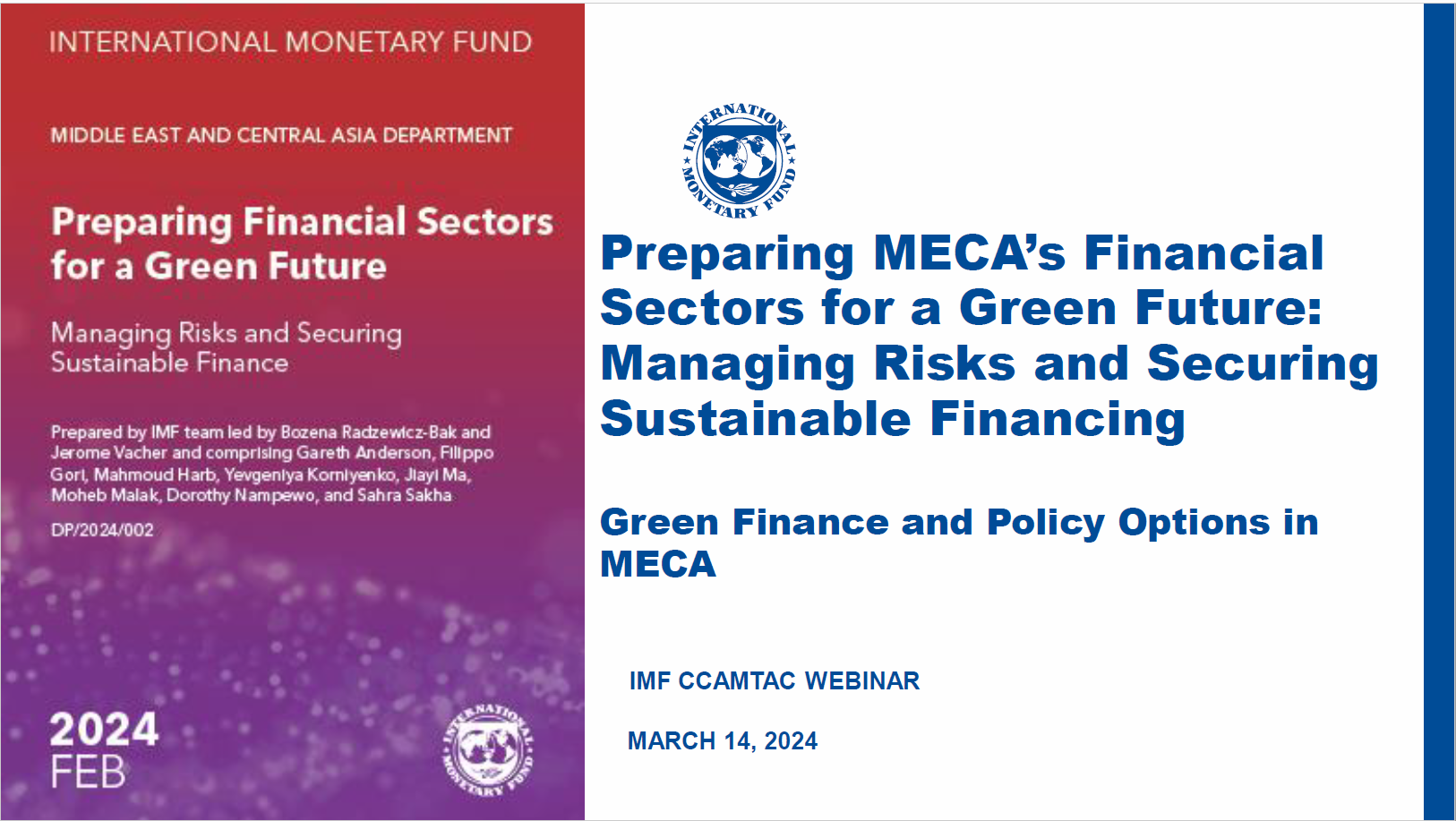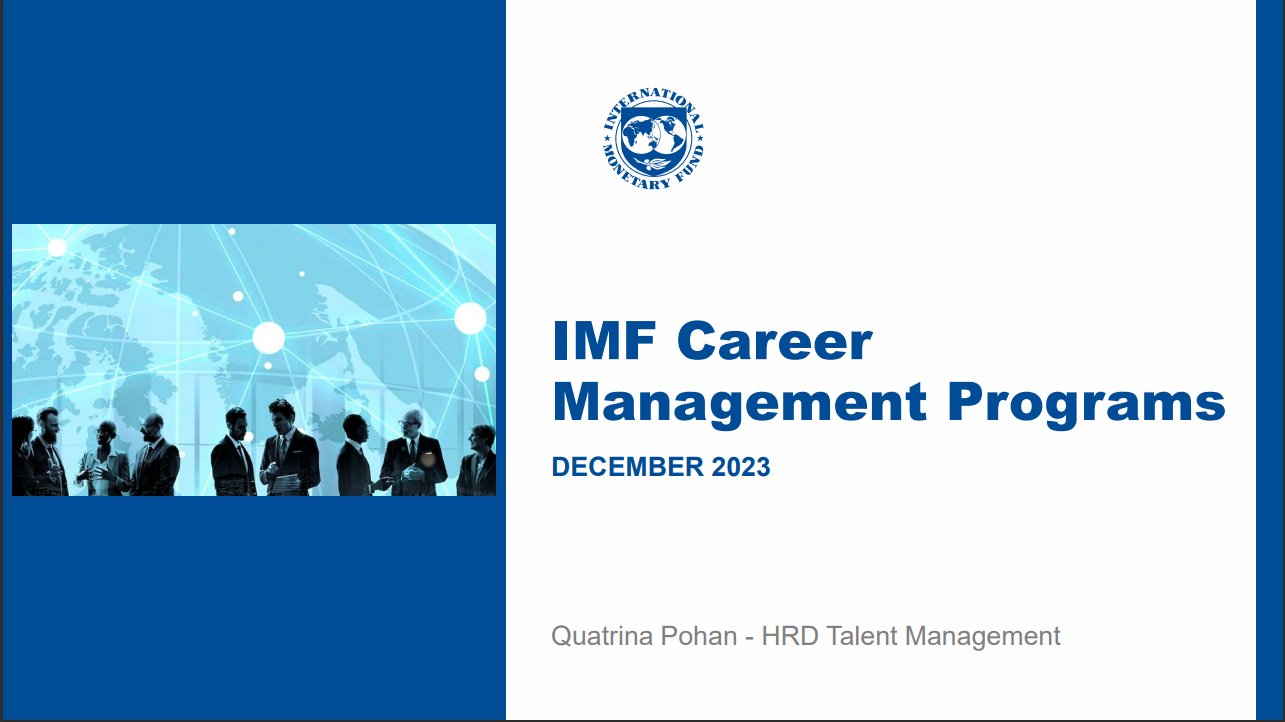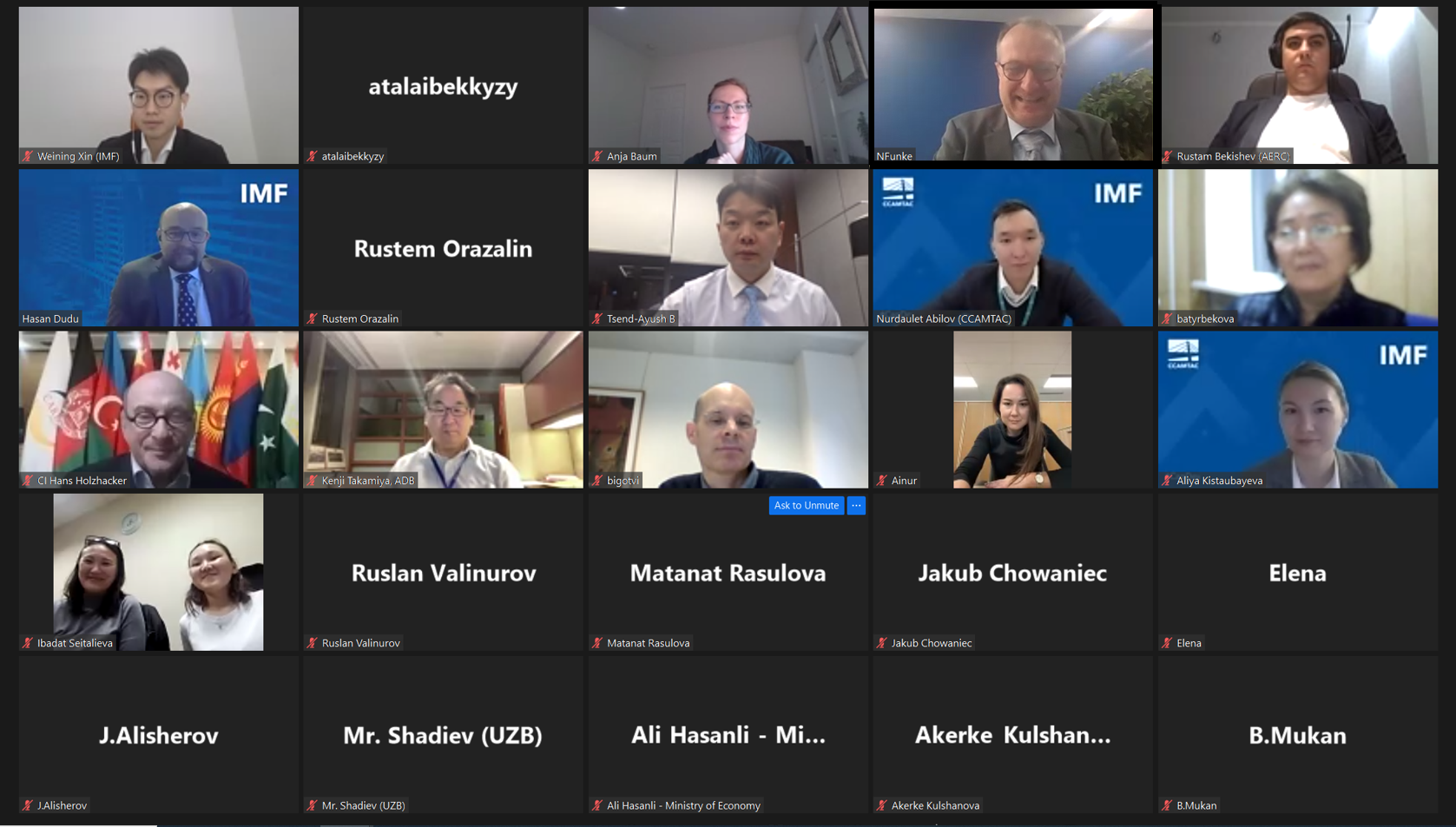| Regional Webinar on “Preparing Financial Sectors for a Green Future.Managing Risks and Securing Sustainable Finance” (March 14, 2024) |
|||
| Presenters Mr. Jerome Vacher, Senior Economist, Middle East and Central Asia Department, IMF Ms. Yevgeniya Korniyenko, Senior Economist, Middle East and Central Asia Department, IMF |
|||
|
Middle East and Central Asian (ME&CA) economies are susceptible to extreme weather events (physical risks), while some are more dependent on oil and gas production, and consequently subject to significant transition risks and the potential buildup of stranded assets. Financial sectors in the region are not immune to those risks and significant structural changes. On the other hand, financial sectors can be seen as potential sources of financing for economic agents and entities that will need to implement adaptation and mitigation measures. According to the IMF’s recent departmental paper, policymakers need to prepare financial sectors for the challenges stemming from climate change and implement policies to enhance the resilience of financial sectors to climate change-related risks and facilitate green financing. For the detailed information please click here. |
||
| Regional Webinar on “Talent Management, Staff Development and Mobility at the IMF – Any Lessons for the Region?" (December 11) |
|||
| Presenters Ms. Quatrina Pohan, Senior Human Resource Officer, Talent Assessment, IMF |
|||
|
Staff mobility, development and training are important to build skills and foster staff development. At the same time, excessive mobility may hinder continuity and advancing a reform agenda. Amid this background, the webinar brought together representatives from the IMF, CCAMTAC, country authorities, and a recruitment firm. Quatrina Pohan explained the mobility policies of the IMF, which encourage staff to gain a diverse range of experiences within the organization and also outside to enhance their career profiles and effectiveness. For example, senior economists have a mandatory mobility requirement after seven years in the same department. Training programs related to professional skills, soft skills, and leadership further support staff development. While generally beneficial, mandatory mobility also leads to some challenges, for example the need to balance business continuity while maintaining consistency of service delivery and a risk to lose institutional knowledge. For the detailed information please click here. |
||
| Regional Webinar on “Regional Developments and Economic Outlook: Building Resilience and Fostering Sustainable Growth (November 16, 2023) |
|||
| Presenters Mr. Hasan Dudu, Economist, Middle East and Central Asia Department, IMF Ms. Anja Baum, Senior Economist, Middle East and Central Asia Department, IMF Mr. Weining Xin, Economist, Asia Pacific Department |
|||
|
Across the Middle East and Central Asia (MECA), the combined effects of global headwinds, domestic challenges, and geopolitical developments weigh on economic momentum, which has been relatively strong in 2022 and early 2023. In the Caucasus and Central Asia (CCA), growth is projected to slow somewhat in 2024 and policy space in several countries in the region is more limited as fiscal debt is higher than before the pandemic. As a part of outreach related to the release of the latest Regional Economic Outlook publication for Middle East and Central Asia, IMF staff gave a comprehensive overview of the Fund’s assessment of economic developments in the region, the forecast of key macroeconomic variables and discussed reforms that can promote resilience and economic prosperity in the broader region in the long run For the detailed information please click here. |
||
| Regional Webinar on ““Regional Developments and Economic Outlook: Building Resilience and Fostering Sustainable Growth (November 16, 2023) |
|||
| Presenter Mr. Hasan Dudu, Economist, Middle East and Central Asia Department, IMF Ms. Anja Baum, Senior Economist, Middle East and Central Asia Department, IMF Mr. Weining Xin, Economist, Asia Pacific Department |
|||
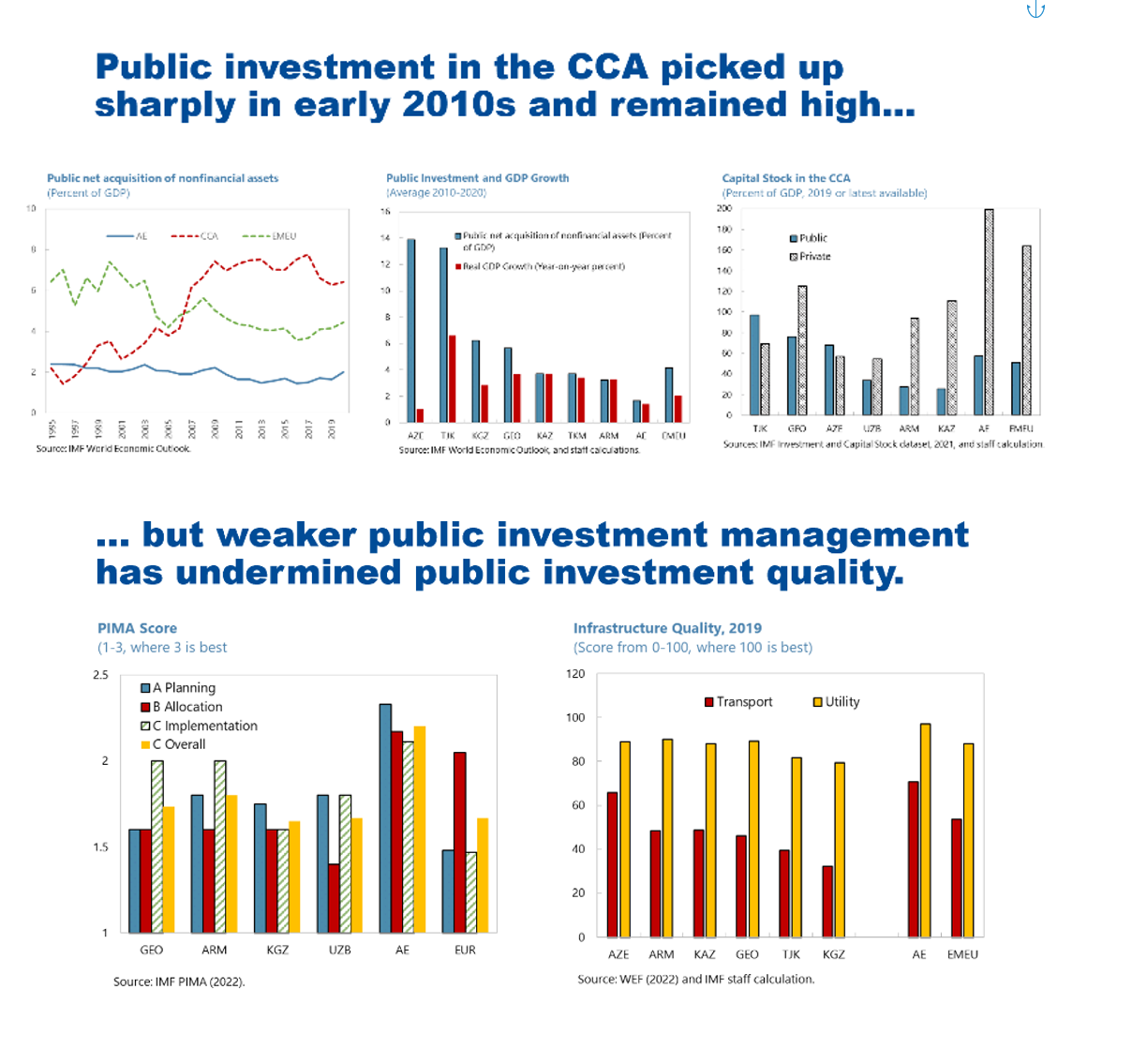 |
The session focused on the role of the state in promoting long-term growth. Following the collapse of the Soviet Union, most countries in CCA were transitioning to a market economy. Even though the CCA region began to move away from central planning in early 1990s, the state footprint remains significant, and the region recorded significant state-led growth. While the state has an important role to play in providing public goods, looking ahead, it should consider re-orienting its activities and focusing more on providing a stable regulatory framework for private investment and private sector-led growth. IMF staff analyzed the areas where the state in its proper role could support such growth. For the detailed information please click here. |
||
| Regional Webinar on “Paving the Way to More Resilient, Inclusive, and Greener Economies in the Caucasus and Central Asia: Structural Determinants of Long-Term Growth” (Part 2) (September 5, 2023) |
|||
| Presenter Mr. Jiri Jonas, Senior Economist, Middle East and Central Asia Department, IMF Mr. Jean van Houtte, Senior Economist, Middle East and Central Asia Department, IMF |
|||
 |
The session focused on the role of the state in promoting long-term growth. Following the collapse of the Soviet Union, most countries in CCA were transitioning to a market economy. Even though the CCA region began to move away from central planning in early 1990s, the state footprint remains significant, and the region recorded significant state-led growth. While the state has an important role to play in providing public goods, looking ahead, it should consider re-orienting its activities and focusing more on providing a stable regulatory framework for private investment and private sector-led growth. IMF staff analyzed the areas where the state in its proper role could support such growth. For the detailed information please click here. |
||
| Regional Webinar on “Paving the Way to More Resilient, Inclusive, and Greener Economies in the Caucasus and Central Asia: Structural Determinants of Long-Term Growth” (Part 1) (August 24, 2023) |
|||
| Presenter Mr. Nikoloz Gigineishvili, Deputy Division Chief, Middle East and Central Asia Department, IMF |
|||
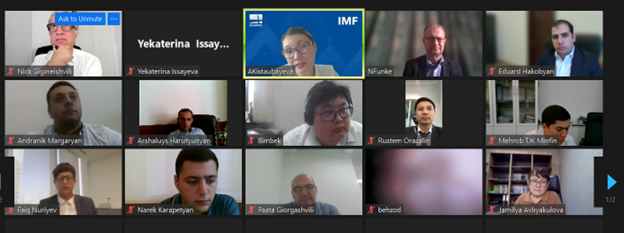 |
Nikoloz Gigineishvili presented the findings of growth diagnostics for CCA countries. He first outlined the trends and the growth constraints facing the region, and then discussed the ways to address these challenges. As demonstrated by various indicators, market and governance reforms slowed since the 2000s in most CCA countries, and with that productivity gains also declined, while contribution of labor to growth has remained small. Without higher and more inclusive growth, it could take decades for the region to close income gaps with more advanced peers in emerging Europe and many countries will continue to struggle to create enough jobs and raising living standards for their population. For the detailed information please click here. |
||
| Regional Webinar on “Social Safety Nets” (June 22, 2023) |
|||
| Presenters Ms. Fernanda Brollo, Senior Economist, Fiscal Affairs Department, IMF Ms. Pamela Dale, Regional Social Policy Advisor, ECARO UNICEF |
|||
) |
This webinar, organized in cooperation with the IMF Fiscal Affairs Department and UNICEF, highlighted the importance of social safety nets (SSN) which contribute to broader social progress and promote a more just and inclusive society by addressing poverty and inequality. In the first part of the event the IMF senior economist discussed the IMF’s framework for engagement on SSN issues. The presentation gave the audience an understanding of the framework for assessing SSN based on their spending adequacy, efficiency and fiscal sustainability and familiarized them with some figures and numbers on the adequacy and coverage of SSN spending in the Caucasus, Central Asia, and Mongolia. A policy expert from UNICEF focused on the poverty situation in the region and elaborated on the social protection coverage by the categories of recipients of social benefits in CCA countries. Following the presentations on SSN, discussants from Uzbekistan and from Armenia shared country experiences and the implementation of SSN. For the detailed information please click here. |
||
| Regional Webinar on “Regional Developments and Economic Outlook: Safeguarding Macroeconomic Stability amid Continued Uncertainty” (May 23, 2023) |
|||
| Presenters Mr. Filippo Gori, Economist, Middle East and Central Asia Department, IMF Mr. Rodrigo Garcia-Verdu, Senior Economist, Middle East and Central Asia Department, IMF |
|||
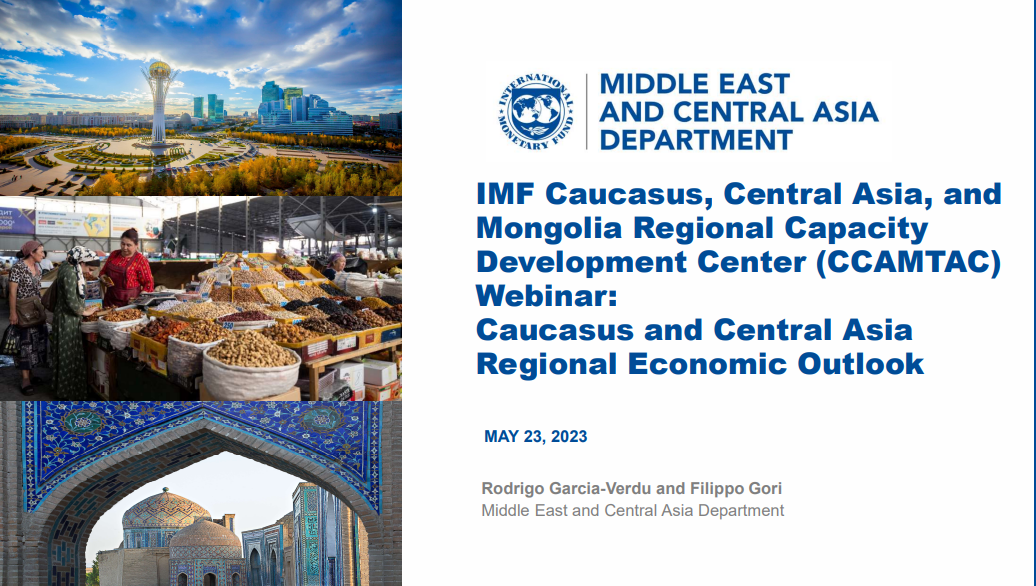 |
While the IMF and CCAMTAC had presented some key outtakes from the Regional Economic Outlook for the Caucasus and Central Asia (CCA), the webinar provided the audience an opportunity to learn in greater detail about the recent economic developments and their implications and forecast of key macroeconomic variables. The first part of the REO presentation, delivered by Filippo Gori, was focused on an overview of key macroeconomic developments in CCA. CCA countries have faced spillovers from the war in Ukraine, including through global commodity prices. For the detailed information please click here. |
||
